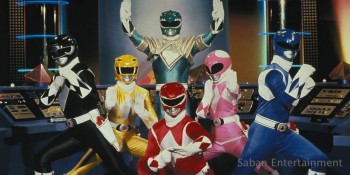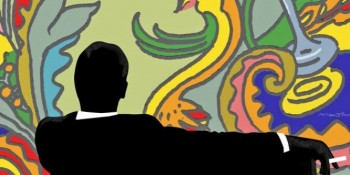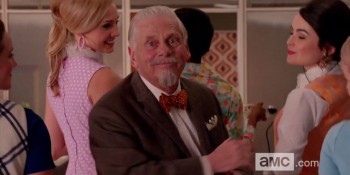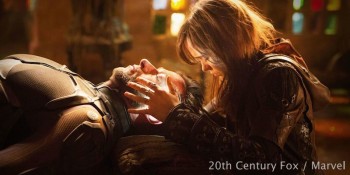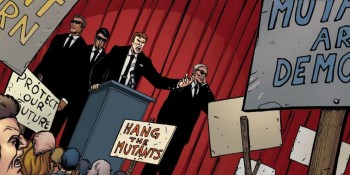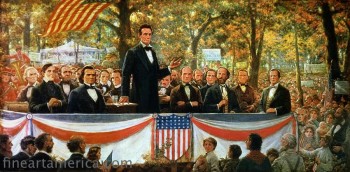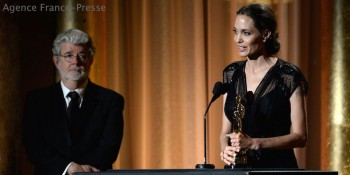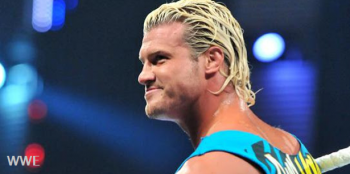The dream of 90s kids everywhere is about to come true. Lionsgate recently announced a partnership with Saban to reboot the Mighty Morphin Power Rangers on the big screen.
As a long time and devoted fan of the Power Rangers, no one was more excited by the announcement than me. However, there are a lot of potential pitfalls about a movie whose source material is maddeningly incomprehensible.
Power Rangers premiered in the United States on Fox in 1993 and quickly became an American sensation. But the Power Rangers are not American creations and are anything but original. Power Rangers is loosely based on a Japanese show, known as Super Sentai, which has been on the air since the 1970s. And not only is Power Rangers based on Super Sentai, but it actually uses the Japanese footage of the heroes, monsters, and Zords, spliced with shots of American actors reacting to things. The show then mixes this footage into what can politely be called a story, and Saban makes millions of dollars off of toy sales.
But I love it. Millions of fans across a generation love it as well. And now we want a Power Rangers movie, but we want it to make sense while still not being an embarrassingly terrible adaptation like Dragonball: Evolution. So what to do?
The first thing Saban and Lionsgate should do, before even culling the 150 Mighty Morphin episodes for potential stories, is determine the audience. Power Rangers has survived for two decades by being colorful and exciting to every child watching for the first time. The stark dichotomy between good and evil, the bright and interesting costumes, the giant robot animals, and the incredibly unnecessary dance moves performed when starting a fight make the show impossible for children to hate. And the show is still on the air, providing happiness for kids everywhere who will undoubtedly want to see a Power Rangers movie the minute they hear about it.
However, there is an entire generation of fans of the original who are adults now and want to see our childhood stories retold in a way that makes us feel young again while intriguing our adult sensibilities. That makes the job of the Lionsgate writers incredibly difficult, but not impossible.
The short answer is to make a PG-13-rated movie. The G.I. Joe and Transformers films, which similarly traded in nostalgia, are PG-13. For the most part, these movies thread the needle well for reaching a broad audience, and lessons can be taken from them.
The G.I Joe movies were based on a 1980s children’s show, but honestly were always about guns, swords, and war, just like Power Rangers. But the G.I. Joe movies were also pretty bad. The first one at least seemed to understand what was great about the franchise — the advanced technology, the sense of heroism, etc. — and ran with it, but the second, starring The Rock, forgot all of that and decided instead to make a popcorn action-and-explosions movie, full of terrible one-liners and forgettable characters.
The Transformers movies, however, were (mostly) much better. Though there is obviously a lot of criticism out there for these Michael Bay explosion festivals, the movies have been quite successful, and in this Nerd’s opinion, very enjoyable. The Transformers trilogy took what was essential about the franchise, updated it, set it up in the post-9/11 America we all know and love, and made two interesting movies — and whatever you want to call that nonsense in Egypt.
Most importantly, Bay’s series was able to appeal broadly to kids and adults. Kids, who can still watch Transformers on television, loved the action, the story about good and evil, and the explosions. Adults loved the action, the story about good and evil, and the explosions. And the adult men loved Megan Fox and Rosie Huntington-Whitely. The constant references to male genitalia were veiled enough that the kids mostly didn’t notice.
With enough giant robot fights and at least a coherent story, a Power Rangers movie can be just as successful, if not more than, Transformers.
Unfortunately, to achieve Bay-levels of testostersplosions requires an incredible budget, which I doubt Lionsgate is willing to provide. Despite backing the most successful domestic movie of 2013, Lionsgate is not the biggest monster in Finster’s factory. And Power Rangers on the silver screen is not yet a known entity. Lionsgate is likely to provide a relatively small budget for the heroes, and we will probably be treated to visual effects not much better than the Mighty Morphin Power Rangers film of the 90s.
But Lionsgate isn’t Legendary Pictures. They actually support filmmakers who know how to script a story well for the big screen, even if that story is Twilight. So the next question is: what can Lionsgate take from the source material in order to create a compelling blockbuster?
In short, not much. Power Rangers fans are not as rabid as Batman fans and won’t decry the death of their favorite characters just because of a questionable casting choice. (But really, Ben Affleck?) All Lionsgate has to do is give us five, maybe six, teenagers with attitude, dressed in bright spandex, taking orders from a translucent floating head and his robot life partner, fighting horrible monsters, and piloting 30-story mechanized animals. Other than that: you are free to do as you please.
After all, the Power Rangers origin story lasts all of 10 minutes. The primary villain was trapped inside a dumpster since before recorded human history and was freed by astronauts during what appeared to be a beautiful sunlit morning on the moon. Zordon, transdimensional wizard that he is, determined the best way to handle this vengeful threat to humanity was to entrust superpowers to five randomly selected children.
Lionsgate can start by expanding this origin story from 10 minutes to 60. Let us learn some things about the characters and why an ancient alien would entrust the fate of the planet to these young heroes. What makes Jason a good leader? Why is Billy so closed off from the world? Why is Kimberly so annoying? The five original Rangers are a blank slate. Paint away, Lionsgate, paint away.
The important thing for this reboot, as with any cinematic adaptation, is not to be beholden to specific storylines, but to adapt the themes and core qualities of the source material. This is where Winter Soldier succeeded and Man of Steel failed. Both movies were adapting heroes with hokey backgrounds from a different era, but Marvel embraced the iconic and heroic nature of Captain America, while Warner Brothers ran away from what makes Superman special.
The Power Rangers on the silver screen should not be lame — except Billy, of course — but they should be heroic and inspiring, even if their home is grittier than the Angel Grove we have come to love. The Power Rangers should become the symbol of light needed in a dark world facing an attack from an alien force of unknown origin. The men and women under the masks, however, should be flawed humans struggling with bearing that burden on their shoulders. Unlike Superman, Jason, Trini, Zack, Kimberly, and Billy were not born to be superheroes but were drafted into a war. Their lives were changed forever, and like Spider-Man, the Power Rangers must accept the responsibility that their powers require of them.
Whatever Lionsgate decides to do, I can guarantee that I will be at the theater for the movie’s premiere. As someone who’s life has been heavily influenced by the Power Rangers, I hope to see this franchise successful on the silver screen. And Lionsgate, I’m available if you need writers.
Postscript:
Lionsgate has complete freedom in terms of what origin story to tell, but with a sequel inevitable, there is one story that needs to be told. “Green with Evil” told the story of an evil Power Ranger who was granted his powers by Rita Repulsa. This Green Power Ranger was Tommy Oliver, the new kid in school. Tommy spent five episodes schooling the other Rangers, completely dismantling them, while holding the advantage of fighting a team of heroes unwilling to kill someone whom they knew was under an evil spell. As great as this story is, however, it requires a team of heroes who have already been established as credible. An evil Power Ranger means nothing if the world doesn’t already know the Rangers as heroes.
Of course, this leads to the most important question of all: will Jason David Frank, the original Green Ranger, be a part of this new movie? I hope so, and plenty of fans do as well. A reboot means a big role is unlikely, however, but we can at least hope for a Stan Lee-like cameo from everyone’s favorite ranger. Perhaps JDF will even be granted a larger role as a mentor of sorts to the new Rangers, though without the history of the Tommy Oliver character connected to him.
Sound off. What do you most want to see from the new Power Rangers movie? And please, don’t all say Polluticorn.
